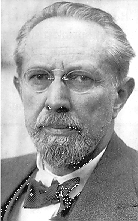| Profile | Major Works | Resources |
Werner Sombart, 1863-1941.

A leading member of the last generation of German Historical School.
Educated at Berlin under Schmoller and Wagner (with side-stints in Pisa and Rome), obtaining his doctorate in 1888 with a historical thesis on the Roman Campagna. In 1890, Werner Sombart appointed to an academic position in political sciences at the University of Breslau, where he remained until 1906. He subsequently took an appointment at the Berlin technical Hochschule. Sombart finally succeeded to Wagner's chair at Berlin in 1917.
Werner Sombart's early Marxian writings (1894, 1896, 1902) - which include two laudatory studies of its founders (1895, 1909) - did much to disengage the German Historical School from the heritage of the Schmoller group.
However, in his later work, Sombart began giving way to a more conservative and nationalist and finally a overtly Nazi position, This turnaround might perhaps be explained by the fact that Sombart lived in the margins of German academia for so long and felt that he needed to become political acceptable in order to earn a high academic appointment (eventually at Berlin in 1917, succeeding Wagner and Schmoller, both of whom died that year). Alternatively, some claim that Sombart was but a quintessential German "romantic nationalist" - worshipping all heroes, whether they stood in factory workboots or in Prussian cavalry boots. In Sombart, the entrepreneur was lauded quickly enough, together with the militant worker and later on,, the "Führer". In contrast, throughout most of his works, the "bourgeoisie", from whatever the vantage point, was consistently denigrated. Sombart's exaggerated and fanciful style of writing certainly gave evidence for that explanation.
Although Sombart's later work, in its content as well as in its bombastic style, has earned him little respect both within and without the economics world, it has nonetheless been colorful. Like Weber, he sought to turn Marx on his head. The roots of capitalism, Sombart claimed, came not from economic reality but rather from an idea - namely, the Enlightenment ideal of reason and control of nature. He claimed this in his high-water book, Modern Capitalism (1902) - still lauded as a masterpiece today by sociologists and "total history" scholars such as Fernand Braudel. Although still characteristically fanciful and poorly researched in its economic and historical content, the methodological principles of the youngest historical school were laid out in this treatise, breaking with the Schmoller variety of practical, normative inductivism and engendering the positivist study of what Spiethoff would later call "economic styles".
Sombart's 1911 work traced capitalist acquisitiveness and success to the spread and rise of Jews in Central and Northern Europe - directly contradicting Weber's famous thesis relating it to Protestantism. His work on Jews earned him no friends -- Jews and liberals found it crudely anti-Semitic, while anti-Semites and conservatives considered it too pro-Semitic. By and large, scholars found its sources (if given) questionable and without research merit. But Sombart's book was sadly successful on the marketplace. It had a popular impact which was, if anything, infinitely lamentable. It provided the economic, racial, philosophical and historical "evidence" for the distorted portrait of the stereotypical crafty Jewish capitalist which was then gaining wider acceptance in Europe.
In a later work (1913), Sombart changed tack again. Now he tried to forge a relation between the development of trade and cities to the emergence of capitalism -- a wholly more worthwhile treatise, replicated in more recent years by economic historians such as Henri Pirenne. However, he could not control his outrageous imagination. At one point, Sombart decided to blame capitalism on women - or rather, on the idea that the emergence of idle middle-class females had forced men to provide the luxurious gifts they fussily demanded, thereby engendering in males the spirit of capitalist acquisition.
In 1915, Sombart finally broke out into complete romantic nationalism with a heavy-handed attack on Great Britain with his Händler und Helden, directly transferring his anti-Semitic stereotype of the "crafty trading people" from Jews to Englishmen. This was followed up with the utterly and explicitly Nazi book Deutscher Socialismus (1934, translated as A New Social Philosophy). This shameful work, which became a highly-distributed textbook in Nazi Germany, was the culmination of Sombart's confused life.
|
Major Works of Werner Sombart
|
|
HET
|
|
Resources on Werner Sombart
|
All rights reserved, Gonçalo L. Fonseca
